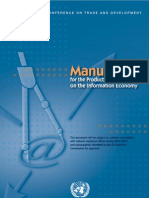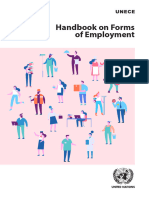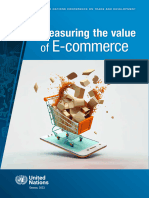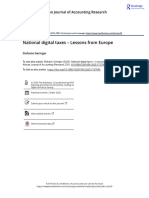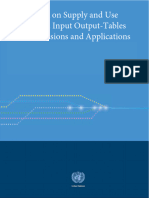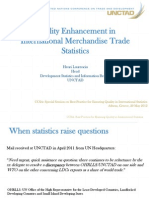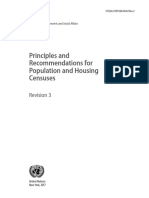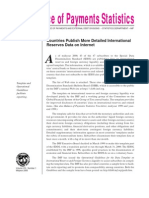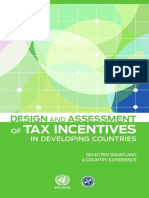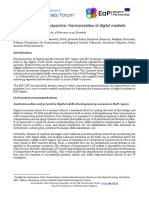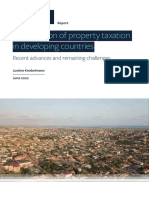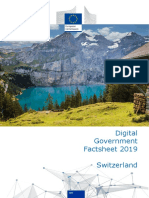Invitation NA 2023
Invitation NA 2023
Uploaded by
lana hCopyright:
Available Formats
Invitation NA 2023
Invitation NA 2023
Uploaded by
lana hCopyright
Available Formats
Share this document
Did you find this document useful?
Is this content inappropriate?
Copyright:
Available Formats
Invitation NA 2023
Invitation NA 2023
Uploaded by
lana hCopyright:
Available Formats
28 November 2022
Subject: Meeting of the Group of Experts on National Accounts
25-27 April 2023, Geneva
Dear Colleague,
I am pleased to inform you that the United Nations Economic Commission for Europe
(UNECE) is organizing a meeting of the Group of Experts on National Accounts on 25-27 April 2023.
The meeting will take place in person in Palais des Nations, Geneva.
The meeting is prepared by the UNECE Steering Group on National Accounts in
consultation with the Intersecretariat Working Group on National Accounts (ISWGNA). The aim is
to inform on progress of the update of the 2008 System of National Accounts (2008 SNA) and the
Balance of Payments Manual, 6th Edition (BPM6) and to focus on other topical issues facing
National Accounts and Balance of Payments compilers.
The Group of Experts on National Accounts will discuss the following substantive topics:
• Session 1: Progress of the 2008 SNA / BPM6 Update
The session will introduce the status of the work programme for Updating the 2008 SNA
and BPM6 by the Project Manager and Lead Editor and a report by the Communication Taks Team
on progress since the previous meeting of the Group of Experts in May 2022. The session will also
look at new developments in the areas of Globalization, Digitalization, Well-being and
sustainability, and Informal economy. It will pay specific attention to the results of the testing and
early implementation of the Guidance Notes, country implementation plans and will present for
discussion drafts or annotated outlines of selected chapters of the updated manuals. The following
topics would be covered:
Globalization will focus on the recommendations in the area of globalization for the update
of the 2008 SNA and BPM6, including particularly the treatment of marketing assets as well as the
development of statistics to support an understanding of changes in global production
arrangements due to the role of multinational enterprises as well as special purpose entities.
Countries are encouraged to test the recommendations and share experiences on early
implementation, including the development of supplemental tables, information on data sources,
estimation methods, use of the decision tree for the intellectual property ownership and how the
stakeholder community is responding to the updated guidance on globalization.
Digitalization will focus on the recommendations in the area of digitalization for the update
of the 2008 SNA and BPM6, including data as an asset, artificial intelligence, cloud computing,
digital intermediary platforms, crypto assets and non-fungible tokens. The session would aim to
share experiences on testing the recommendations and to exchange ideas on early
United Nations Economic Commission for Europe
Palais des Nations, 1211 Geneva 10, Switzerland
Telephone: +41 (0)22 917 1906
Email: tihomira.dimova@un.org
Page 2
implementation, including discussion on data sources, estimation methods, and how the
stakeholder community is responding to the increased visibility of the digital economy in
macroeconomic statistics.
Well-being and sustainability will focus on experiences in testing and early implementation
of the recommendations in areas such as unpaid household activities, distributional accounts,
health care, education and human capital, and environmental-economic issues. Furthermore, the
session would seek to exchange best practices on how countries are presenting this information in
combination with traditional macroeconomic results, providing users with a more comprehensive
and consistent overview of issues affecting household’s current and future well-being.
Informal economy will review the progress with developing a framework for the informal
economy in the updated 2008 and BPM, consistent with the resolutions of the ILO International
Conference of Labour Statisticians. The framework defines the scope of the informal economy,
covering the informal labour inputs of formal enterprises and non-registered households
production of goods and services for own use and redefines the informal sector. It considers the
issues of informality facilitated by digitalization, as well as informal cross border flows. The
session will seek to present countries’ efforts to measure the elements of the framework and
issues related to estimation of the informal sector and non-observed economy.
• Session 2: The impact of high inflation on National Accounts
This session will discuss the impact of high inflation on national accounts, consistency of
deflators across economic statistics, considerations national accountants should make in times of
high inflation and related risk assessment. Papers and presentations on country experience in these
topics are invited.
• Session 3: Real time indicators and nowcasting techniques
There is an increasing user demand for timely statistics. The Covid-pandemic and the
current inflationary pressures have only reinforced these demands. In response, several countries
have started to work on developing real time indicators, often on the basis of nowcasting
techniques combining historic information with more timely data. This session aims to provide an
overview of ongoing initiatives in this area, exchanging best practices and discussing specific
challenges faced in developing these indicators.
• Session 4: Impact of migration on National Accounts
Applying the residency criteria to migrants is not always straightforward, as their legal
status and the intended duration of stay in the hosting country are sometimes unclear. From the
perspective of statistics, these blurred situations risk to be treated differently by different countries,
potentially hampering the international comparability of the data. This session aims at sharing
countries’ practices to deal with migrants in the national accounts.
United Nations Economic Commission for Europe
Palais des Nations, 1211 Geneva 10, Switzerland
Page 3
Countries and international organizations are kindly invited to provide papers and/or
presentations on their experience in the above mentioned areas. If your office would like to submit
a contribution, please send a short abstract via email to national.accounts@un.org by 6 January
2023. Selected documents will be translated in the UNECE official languages provided they are
received by 3 February 2023.
The detailed timetable and all documents will be made available on the following website:
https://unece.org/statistics/events/meeting-group-experts-national-accounts-3
Simultaneous interpretation in the UNECE official languages English, French and Russian
will be provided.
Participants should register before 6 April 2023 by completing the online registration:
https://indico.un.org/event/1003564/registrations/9497/
Should you have questions concerning the meeting, please contact either Ms. Tihomira
Dimova (e-mail: tihomira.dimova@un.org) or Mr. Rami Peltola (e-mail: rami.peltola@un.org).
Yours sincerely
Lidia Bratanova
Director, Statistical Division
United Nations Economic Commission for Europe
Palais des Nations, 1211 Geneva 10, Switzerland
You might also like
- Transfer Pricing Problems in Digital EconomyNo ratings yetTransfer Pricing Problems in Digital Economy13 pages
- Van Der Hoek - 2005 - From Cash To Accrual Budgeting and Accounting in The Public Sector The Dutch ExperienceNo ratings yetVan Der Hoek - 2005 - From Cash To Accrual Budgeting and Accounting in The Public Sector The Dutch Experience14 pages
- 7. IDN - SNA 2025 Changes Overview, Grand MercureNo ratings yet7. IDN - SNA 2025 Changes Overview, Grand Mercure18 pages
- Manual: For The Production of Statistics On The Information EconomyNo ratings yetManual: For The Production of Statistics On The Information Economy184 pages
- United Nations Secretariat Department of Economic and Social Affairs Statistics DivisionNo ratings yetUnited Nations Secretariat Department of Economic and Social Affairs Statistics Division13 pages
- Globalisation in Services: OECD Statistics Working Papers 2008/03No ratings yetGlobalisation in Services: OECD Statistics Working Papers 2008/0338 pages
- g20 Dgi 3 Workplan People Planet EconomyNo ratings yetg20 Dgi 3 Workplan People Planet Economy24 pages
- Gx Eri Global Oil Gas Newsletter Tax 2019 ReportNo ratings yetGx Eri Global Oil Gas Newsletter Tax 2019 Report22 pages
- National Digital Taxes - Lessons From EuropeNo ratings yetNational Digital Taxes - Lessons From Europe20 pages
- OECD ENVIRONET and WP-STAT Workshop On Rio Markers, Climate and Development Finance: Main Points of DiscussionNo ratings yetOECD ENVIRONET and WP-STAT Workshop On Rio Markers, Climate and Development Finance: Main Points of Discussion20 pages
- 2023 - 03 - Recording of Fungible Crypto Assets in Macroeconomic StatisticsNo ratings yet2023 - 03 - Recording of Fungible Crypto Assets in Macroeconomic Statistics9 pages
- CCSA - Best Practicies For Ensuring Quality in Int - Stat.ver2.2No ratings yetCCSA - Best Practicies For Ensuring Quality in Int - Stat.ver2.214 pages
- National digital taxes Lessons from EuropeNo ratings yetNational digital taxes Lessons from Europe20 pages
- UNESCO (2017) Summary of The 3rd TCG Meeting On SDG 4 - Education 2030 IndicatorsNo ratings yetUNESCO (2017) Summary of The 3rd TCG Meeting On SDG 4 - Education 2030 Indicators18 pages
- LACCF2024 Competition Fintechs Open Banking Call For Contibutions ENGNo ratings yetLACCF2024 Competition Fintechs Open Banking Call For Contibutions ENG5 pages
- Balance of Payments Statistics: Countries Publish More Detailed International Reserves Data On InternetNo ratings yetBalance of Payments Statistics: Countries Publish More Detailed International Reserves Data On Internet16 pages
- Action IC1403 MC 180918 MC Meeting Rennes MinutesNo ratings yetAction IC1403 MC 180918 MC Meeting Rennes Minutes4 pages
- 2018 Design Assessment Tax Incentives UN CIATNo ratings yet2018 Design Assessment Tax Incentives UN CIAT187 pages
- Measuring Economic Welfare: What and How?: International Monetary Fund Washington, D.CNo ratings yetMeasuring Economic Welfare: What and How?: International Monetary Fund Washington, D.C49 pages
- Setting Standards: Remarks Given by Dave Ramsden, Deputy Governor For Markets and BankingNo ratings yetSetting Standards: Remarks Given by Dave Ramsden, Deputy Governor For Markets and Banking6 pages
- Principles and Recommendations For Population and Housing Censuses Statistical Papers Ser M 2#revised#e. Edition United Nations100% (6)Principles and Recommendations For Population and Housing Censuses Statistical Papers Ser M 2#revised#e. Edition United Nations84 pages
- Instant download (Ebook) World Statistics Pocketbook 2007 (Statistics Division: Series V) by United Nations.Department of Economic and Social Affairs. Statistics Division ISBN 9789211615098, 9211615097 pdf all chapter100% (1)Instant download (Ebook) World Statistics Pocketbook 2007 (Statistics Division: Series V) by United Nations.Department of Economic and Social Affairs. Statistics Division ISBN 9789211615098, 9211615097 pdf all chapter62 pages
- UNEP CHW EWASTE MANUA EwasteAssessmentMethodologyNo ratings yetUNEP CHW EWASTE MANUA EwasteAssessmentMethodology106 pages
- BG 3l Implementation Strategy for the SEEA Ecosystem Accounting ENo ratings yetBG 3l Implementation Strategy for the SEEA Ecosystem Accounting E21 pages
- Digitalisation of Property Taxation in Developing CountriesNo ratings yetDigitalisation of Property Taxation in Developing Countries50 pages
- Digital Economy in Europe Evaluation of CountriesNo ratings yetDigital Economy in Europe Evaluation of Countries20 pages
- IOTA Data Driven Tax Administration 2016No ratings yetIOTA Data Driven Tax Administration 201664 pages
- Onu - Escwa (Escwa) Report Workshop On International Migration and Development in The Arab Region: Integrating International Migration Into Development Strategies Beirut, 19-22 July 2010No ratings yetOnu - Escwa (Escwa) Report Workshop On International Migration and Development in The Arab Region: Integrating International Migration Into Development Strategies Beirut, 19-22 July 201021 pages
- 'Strengthening Economic and Financial Governance Through Gender Responsive Budgeting ... (PDFDrive)No ratings yet'Strengthening Economic and Financial Governance Through Gender Responsive Budgeting ... (PDFDrive)106 pages
- Issues in International Taxation and The Role of The ImfNo ratings yetIssues in International Taxation and The Role of The Imf19 pages
- Comparative Study of Data Reported To The OECD Creditor Reporting System (CRS) and To The Aid Management Platform (AMP)No ratings yetComparative Study of Data Reported To The OECD Creditor Reporting System (CRS) and To The Aid Management Platform (AMP)38 pages
- Digital Government Factsheets Switzerland 2019No ratings yetDigital Government Factsheets Switzerland 201939 pages
- "SME Data Workshop": Cairo Sheraton Hotel January 17, 2008No ratings yet"SME Data Workshop": Cairo Sheraton Hotel January 17, 200852 pages
- Handbook on Compliance Risk Management for Tax AdministrationsFrom EverandHandbook on Compliance Risk Management for Tax AdministrationsInter-American Center of Tax AdministrationNo ratings yet
- Estimating Value-Added Tax Using a Supply and Use Framework: The ADB National Accounts Statistics Value-Added Tax ModelFrom EverandEstimating Value-Added Tax Using a Supply and Use Framework: The ADB National Accounts Statistics Value-Added Tax ModelNo ratings yet








